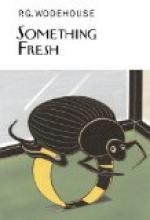“Why not?”
“You are too overwhelming—too much like a bomb. I think you must be one of the supermen one reads about. You would want your own way and nothing but your own way. Now, Freddie will roll through hoops and sham dead, and we shall be the happiest pair in the world. I am much too placid and mild to make you happy. You want somebody who would stand up to you—somebody like Joan Valentine.”
“That’s the second time you have mentioned this Joan Valentine. Who is she?”
“She is a girl who was at school with me. We were the greatest chums—at least, I worshiped her and would have done anything for her; and I think she liked me. Then we lost touch with one another and didn’t meet for years. I met her on the street yesterday, and she is just the same. She has been through the most awful times. Her father was quite rich; he died suddenly while he and Joan were in Paris, and she found that he hadn’t left a cent. He had been living right up to his income all the time. His life wasn’t even insured. She came to London; and, so far as I could make out from the short talk we had, she has done pretty nearly everything since we last met. She worked in a shop and went on the stage, and all sorts of things. Isn’t it awful, George!”
“Pretty tough,” said Emerson. He was but faintly interested in Miss Valentine.
“She is so plucky and full of life. She would stand up to you.”
“Thanks! My idea of marriage is not a perpetual scrap. My notion of a wife is something cozy and sympathetic and soothing. That is why I love you. We shall be the happiest—”
Aline laughed.
“Dear old George! Now pay the check and get me a taxi. I’ve endless things to do at home. If Freddie is in town I suppose he will be calling to see me. Who is Freddie, do you ask? Freddie is my fiance, George. My betrothed. My steady. The young man I’m going to marry.”
Emerson shook his head resignedly. “Curious how you cling to that Freddie idea. Never mind! I’ll come down to Blandings on Friday and we shall see what happens. Bear in mind the broad fact that you and I are going to be married, and that nothing on earth is going to stop us.”
* * *
It was Aline Peters who had to bear the brunt of her father’s mental agony when he discovered, shortly after Lord Emsworth had left him, that the gem of his collection of scarabs had done the same. It is always the innocent bystander who suffers.
“The darned old sneak thief!” said Mr. Peters.
“Father!”
“Don’t sit there saying ‘Father!’ What’s the use of saying ‘Father!’? Do you think it is going to help—your saying ‘Father!’? I’d rather the old pirate had taken the house and lot than that scarab. He knows what’s what! Trust him to walk off with the pick of the whole bunch! I did think I could leave the father of the man who’s going to marry my daughter for a second alone with the things. There’s no morality among collectors—none! I’d trust a syndicate of Jesse James, Captain Kidd and Dick Turpin sooner than I would a collector. My Cheops of the Fourth Dynasty! I wouldn’t have lost it for five thousand dollars!”




